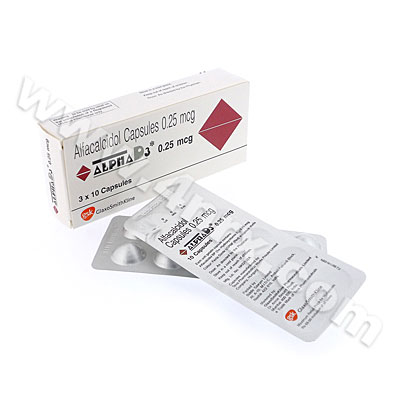 |
Home  General Health General Health  Alpha D3 (Alfacalcidol BP) Alpha D3 (Alfacalcidol BP) |
|
|||||||||
|
Alpha D3 (Alfacalcidol BP)
What is Alpha D3 (Alfacalcidol BP) used for? Alpha D3 (Alfacalcidol BP) contains the active ingredient alfacalcidol, which is a form of vitamin D. It is given to patients with a reduced kidney function, to help them increase the level of calcium in the blood, thereby helping to reduce the breakdown of bones. It is also given to people with various bone diseases, to help increase calcium. How should I use Alpha D3 (Alfacalcidol BP)? Alpha D3 (Alfacalcidol BP) capsules are taken orally, usually once daily. These capsules may be taken with or without food. The exact dosage required depends on the amount of calcium in the patient's blood. Therefore, it is essential to consult your physician before taking this medication so that the correct dosage can be prescribed. What are the side effects of Alpha D3 (Alfacalcidol BP)? Patients taking Alpha D3 (Alfacalcidol BP) may experience some side effects, such as:
Patients should consult their physician immediately if any of these side effects persist or worsen. Please Note Strictly follow all instructions provided to you by your physician or pharmacist while using Alpha D3 (Alfacalcidol BP). Optimum and safe dosage can differ based on the patient and the condition being treated. As this medication may be unsafe for certain patients, it is essential you always inform your physician if you are pregnant or breastfeeding, as well as if you have any allergies, other illnesses, or ongoing health conditions, and if you are taking any other form of medication, supplements, or herbal products. Patients should be aware that it is necessary to have regular blood tests while taking this medication, so that the levels of calcium in the blood can be checked. You should keep all medical appointments, and inform your physician immediately if you notice abnormally frequent urination, thirst, dryness or an unusual taste in the mouth, weakness, muscular pain or persistent vomiting. Immediately seek emergency medical care if you have any allergic or hypersensitive reaction. Common signs of a reaction include hives, swelling, skin rashes, chest pains, as well as trouble breathing or swallowing. 
|
|||||||||||||||||